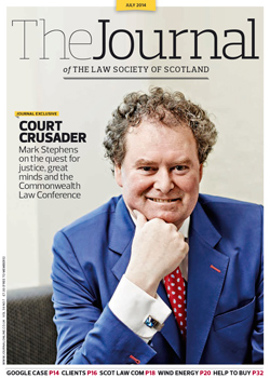The cooling-off catch

Heard about the scam businesses which cold call customers at their homes? Nothing to do with you or your practice? Well, if you engage with private clients out of the office or using distance communication (even if invited to do so), then under new extended rules those clients may have similar rights as if you were doorstop calling.
In force on 14 June 2014, the Consumer Contract (Information, Cancellation and Additional Charges) Regulations 2013 allow a private client a right to cancel (or “cool off”) for an extended period of 14 days, and you should not start work unless specifically requested to do so during this period. Solicitors must inform their clients of the right to cancel or they (and their firm) may face potential criminal sanctions, and find that the cancellation period extends to up to one year.
Although it possibly may come as a surprise to you, these regulations are not new, but extend and replace the previous rules relating to distance selling and doorstep selling, the Consumer Protection (Distance Selling) Regulations 2000 and the Cancellation of Contracts made in a Consumer’s Home or Place of Work etc Regulations 2008. Law firms may wish to review the new regulations and update their office practices and engagement letters, as required.
When do the regulations apply?
The regulations apply when you, as a professional (and trader), engage a consumer wholly or mainly for purposes outwith their trade, business, craft or profession. Clearly private clients will be covered, but for other individuals, it may be necessary to enquire further into the purpose.
For example, the purchase of a property for a company director, personally, to be used for business and personal use, might fall within scope.
The rules differ depending on how the contract with the client is made. Contracts are categorised into:
- On-premises: all contracts which are not off-premises or distance contracts.
- Off-premises: where clients are engaged out of the office (including at their home or office, a hospital or police station) or on an excursion or marketing event.
- Distance selling: using a distance selling scheme where the contract was formed exclusively at a distance – might cover websites providing legal services, such as conveyancing, will writing or PPI claims.
Information requirements
Clear and comprehensible information (before contract) must be provided to all private clients, including details of: the firm, the service provided, costs, duration and cancellation, and complaints procedures. Most firms already provide this information in their client care letters. Supplying and providing legal documentation (and other content) by digital means, may be considered digital content, and require further technical information to be provided.
Off-premises and distance contracts
For these contracts, additional obligations apply:
- further prescriptive information requirements; in particular, to inform on the right to cancel (breach of which would be a criminal offence) and to provide a cancellation form;
- the “cooling-off period” (except in limited cases) has been extended to 14 days after formation of the contract, and up to one year if informed late or not at all. Practically, lawyers should not start work until after this period unless their clients specifically waive their rights. Otherwise, they risk not being able to recover their fees if their clients cancel in this period.
Sanctions and enforcement
Despite poor compliance (on precursor regulations) recently reported by the Scottish Trading Standards Internet Project 2012-13, in practice, Trading Standards normally prefer informal and collaborative methods with a largely reputable trade. The Scottish Legal Complaints Commission indicated that they might signpost issues to Trading Standards, as appropriate.
Next steps
So, could these regulations concern you? You and your firm might want to consider when they apply, and check engagement letters and client practices, particularly when private clients are engaged out of the office. You might want to ensure private clients waive their right to cancel if the matter is urgent. Kerry Trewern (deputy director, Edinburgh Centre for Professional Legal Studies) says: “It seems important that firms provide robust training to ensure compliance."
Beware the urgent case
Tessa Till (private client tutor, Edinburgh Centre for Professional Legal Studies) comments: “I regularly offer to go and see clients in their home to discuss their affairs, possibly for mobility reasons or to put them at ease. “I foresee some difficulties, where, for example, a will needs to be updated for an elderly or infirm client and timescales may not allow for a 14 day ‘cooling off’ period.”
In this issue
- “The Union and the law” revisited
- Cartels: raising the stakes
- The cooling-off catch
- Attack vectors into the law: smartphones
- Money laundering: the Fourth way
- Has Glasgow morality come to Edinburgh?
- Reading for pleasure
- Opinion: Graeme McCormick
- Book reviews
- Profile
- President's column
- 10-year target
- Headline act
- Forget that you ever knew me
- The cooling-off catch (1)
- Tax devolution: the legal implications
- Ninth life
- Planning: how does the wind blow?
- Going off the rails
- Employee shares? Sort them yourself
- Angostura, anyone?
- National priorities
- Scottish Solicitors' Discipline Tribunal
- People on the move
- Heart of the action
- Helping solicitors on Help to Buy
- Conditions countdown
- Where bullocks fear to roam
- Fit to grant?
- Controlling the risks
- Ask Ash
- Opening up the law
- From the Brussels office
- Law reform roundup
- Post-corroboration Review update






